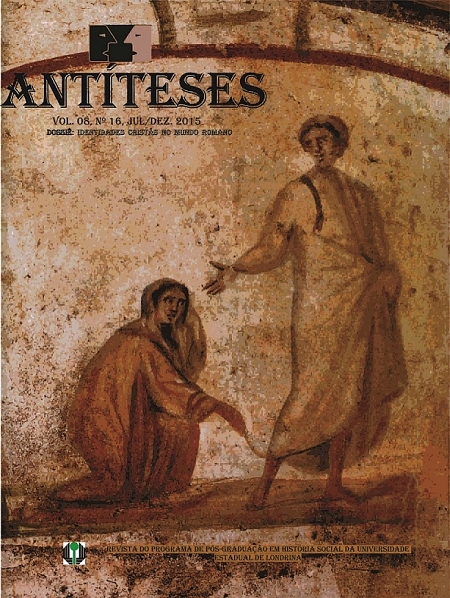The frailties of 'basileia' according to John Chrysostom: some remarks on the treatise 'A comparison between a king and a monk'
DOI:
https://doi.org/10.5433/1984-3356.2015v8n16p130Keywords:
Late antiquity, Antioch, Basileia, Monasticism, John ChrysostomAbstract
Living in a society under the threat of Persians and Barbarians, John Chrysostom, differently from his predecessors, like Eusebius of Cesarea, did not devise the Graeco-Roman basileia as an institution that bore any special religious meaning. As for him, the Roman Empire was just a gathering of humans governing other humans due to an election; a government that did not arise from a natural basis and did not exhibit any mystical, supernatural capacity, for such government was not geared to linger on. In his works, John Chrysostom seldom mentions the Imperium Chistianum and the emperors of his time, subjects which did not attract his attention. Truth to tell, according to the author, the basileus did not represent a Christian model that should be followed by his contemporaries. Such honor should be bestowed on the monks instead. In light of these remarks, we intend to discuss, in this article, some characteristics of the monarchy in the Late Antiquity, a time span when we witness the flourishing of the monasticism as well. In order to do that, we deal with one of John's first works: the treatise A comparison between a king and a monk, written in Antioch, John's homeland, in the first years of the decade of 370 A. D.Downloads
Download data is not yet available.
References
DOCUMENTAÇÃO PRIMÁRIA IMPRESSA
CHRYSOSTOM. Homilies on the epistles of Paul to the Corinthians. Peabody: Hendrickson, 2004.
EUSEBIO DE CESAREA. Vida de Constantino. Introducción, traducción y notas de Martín Gurruchaga. Madrid: Gredos, 1994.
JOHN CHRYSOSTOM. A comparison between a king and a monk. Against the opponents of the monastic life. Translated with an introduction by David G. Hunter. Lewiston: The Edwin Meller Press, 1988.
PALLADIUS. Dialogue on the life of St. John Chrysostom. Translated by Johannes Quasten. Mahwah: Paulist Press, 1985.
SÃO JOÃO CRISÓSTOMO. Comentário às cartas de São Paulo. São Paulo: Paulus, 2010. v. 2.
BIBLIOGRAFIA
BAUR, C. John Chrysostom and his time. Westmister: Newman Press, 1959.
BERARDINO, A. (Ed.). Dicionário patrístico e de antigüidades cristãs. São Paulo: Paulus, 2002.
BÍBLIA. Português. Bíblia de Jerusalém. Edição coordenada por Gilberto Gorgulho, Ivo Storniolo e Ana Flora Anderson. São Paulo: Sociedade Bíblica Católica Internacional, 1997
BRÄNDLE, R. Jean Chrysostome, Saint Jean Bouche d'or (349-407): Christianisme et politique au IVe siècle. Paris: Du Cerf, 2003.
BROCK, S. P. Early Syrian asceticism. Numen, v. 20, n. 1, p. 1-19, 1973.
BROWN, P. The rise and function of the holy man. The Journal of Roman Studies, v. 61, p. 80-101, 1971.
CANER, D. F. Not of this world: the invention of monasticism. In: ROUSSEAU, P. (Ed.). A companion to Late Antiquity. Oxford: Wiley-Blackwell, 2012. p. 589-600.
CARTER, R. E. Sain John Chrysostom's rhetorical use of Socratic distinction between kinghip and tyranny. Traditio, n. 14, p. 367-370, 1958.
DOWNEY, G. A history of Antioch in Syria. Princeton: Princeton University Press, 1961.
DRAKE, H. Church and Empire. In: HARVEY, S. A.; HUNTER, D. G. (Ed.). The Oxford handbook of Early Christian studies. Oxford: Oxford University Press, 2010. p. 446-464.
DVORNIK, F. Early Christian and Byzantine political philosophy. Washington: The Dumbarton Oak Center for Byzantine Studies, 1966. v. 2.
FESTUGIÈRE, A. J. Antioche païenne et chrétienne: Libanius, Chrysostome et les moines de Syrie. Paris: E. de Boccard, 1959.
GONZÁLEZ SALINERO, R. El antijudaísmo cristiano occidental (siglos IV y V). Madrid: Trotta, 2000.
HORNBLOWER, S.; SPAWFORTH, A. (Ed.). The Oxford classical dictionary. Oxford: Oxford University Press, 2012.
HUNTER, D. G. Introduction. In: JOHN CHRYSOSTOM. A comparison between a king and a monk. Against the opponents of the monastic life. Lewiston: The Edwin Mellen Press, 1988. p. 1-68.
KELLY, J. N. D. Golden Mouth: the story of John Chrysostom - ascetic, preacher, bishop. London: Duckworth, 1995.
LENSKY, N. Valens and the monks: cudgeling and conscription as a means of social control. Dumbarton Oak Papers, v. 58, p. 93-117, 2004.
LEROUX, J. M. Saint Jean Chrysostome et le monachisme. In: KANNENGIESSER, C. (Ed.). Jean Chrysostome et Augustin. Paris: Beauchesne, 1975. p. 125-144.
LIEBESCHUETZ, J. H. W. G. Ambrose and John Chrysostom. Oxford: Oxford University Press, 2011.
MARAVAL, P. Le monachisme oriental. In: MAYEUR, J. et al. Histoire du Christianisme. Paris: Desclée, 1995. t. 2, p. 719-745.
MAYER, W. What does it mean to say that John Chrysostom was a monk ? Studia Patristica, v. 41, p. 451-455, 2006.
MONTEFIORE, S. Jerusalém, a biografia. São Paulo: Companhia das Letras, 2013.
MORESCHINI, C.; NORELLI, E. História da literatura cristã antiga grega e latina. São Paulo: Loyola, 2000.
PASQUATO, PASQUATO, O. Giovanni Crisostomo e l'Impero Romano. In: INCONTRO DI STUDIOSI DELL'ANTICHITÀ CRISTIANA: Giovanni Crisostomo: Oriente e Occidente tra IV e V secolo, 33., 2004, Rome. Roma: Institutum Patristicum Augustinianum, 2005. p. 781-798.
QUASTEN, J. Patrology. Notre Dame: Christian Classics, 1949. v. I.
RUBENSON, S. Ascetiscism and monasticism, I: Eastern. In: NOBLE, T.; SMITH, J. The Cambridge History of Christianity. Cambridge: Cambridge University Press, 2008. p. 637-668.
SANDWELL, I. Christian self-definition in the fourth century AD: John Chrysostom on Christianity, imperial rule and the city. In: SANDWELL, I.; HUSKINSON, J. (Ed.). Culture and society in Later Roman Antioch. Oxford: Oxbow Books, 2004. p. 35-58.
SCHAFF, P.; WACE, H. (Ed.). The seven ecumenical councils. Peabody: Hendrickson, 2004. v. 14.
SILVA, G. V. da. Constâncio II, o Anticristo: Hilário de Poitiers e a construção da imagem imperial. Dimensões, v. 15, p. 219-235, 2003a.
SILVA, G. V. da. Reis,santos e feiticeiros: Constâncio II e os fundamentos místicos da basileia (337-361). Vitória: Edufes, 2003.
SILVA, G. V. da; MARVILLA, M. De laudibus Constantini; o discurso de Eusébio de Cesaréia sobre a realeza. Dimensões, v. 18, p. 384-392, 2006.
SOLER, E. Le sacré et le salut à Antioche au IVe siècle apr. J.-C. Beyrouth: Institut Français du Proche-Orient, 2006.
TEJA, R. Monacato e história social: los orígenes del monacato y la sociedad del Bajo Imperio romano. In: HIDALGO DE LA VEGA, M. J. (Ed.). Homenaje a Marcelo Vigil Pascual. Salamanca: Universidad de Salamanca, 1989. p. 81-96.
CHRYSOSTOM. Homilies on the epistles of Paul to the Corinthians. Peabody: Hendrickson, 2004.
EUSEBIO DE CESAREA. Vida de Constantino. Introducción, traducción y notas de Martín Gurruchaga. Madrid: Gredos, 1994.
JOHN CHRYSOSTOM. A comparison between a king and a monk. Against the opponents of the monastic life. Translated with an introduction by David G. Hunter. Lewiston: The Edwin Meller Press, 1988.
PALLADIUS. Dialogue on the life of St. John Chrysostom. Translated by Johannes Quasten. Mahwah: Paulist Press, 1985.
SÃO JOÃO CRISÓSTOMO. Comentário às cartas de São Paulo. São Paulo: Paulus, 2010. v. 2.
BIBLIOGRAFIA
BAUR, C. John Chrysostom and his time. Westmister: Newman Press, 1959.
BERARDINO, A. (Ed.). Dicionário patrístico e de antigüidades cristãs. São Paulo: Paulus, 2002.
BÍBLIA. Português. Bíblia de Jerusalém. Edição coordenada por Gilberto Gorgulho, Ivo Storniolo e Ana Flora Anderson. São Paulo: Sociedade Bíblica Católica Internacional, 1997
BRÄNDLE, R. Jean Chrysostome, Saint Jean Bouche d'or (349-407): Christianisme et politique au IVe siècle. Paris: Du Cerf, 2003.
BROCK, S. P. Early Syrian asceticism. Numen, v. 20, n. 1, p. 1-19, 1973.
BROWN, P. The rise and function of the holy man. The Journal of Roman Studies, v. 61, p. 80-101, 1971.
CANER, D. F. Not of this world: the invention of monasticism. In: ROUSSEAU, P. (Ed.). A companion to Late Antiquity. Oxford: Wiley-Blackwell, 2012. p. 589-600.
CARTER, R. E. Sain John Chrysostom's rhetorical use of Socratic distinction between kinghip and tyranny. Traditio, n. 14, p. 367-370, 1958.
DOWNEY, G. A history of Antioch in Syria. Princeton: Princeton University Press, 1961.
DRAKE, H. Church and Empire. In: HARVEY, S. A.; HUNTER, D. G. (Ed.). The Oxford handbook of Early Christian studies. Oxford: Oxford University Press, 2010. p. 446-464.
DVORNIK, F. Early Christian and Byzantine political philosophy. Washington: The Dumbarton Oak Center for Byzantine Studies, 1966. v. 2.
FESTUGIÈRE, A. J. Antioche païenne et chrétienne: Libanius, Chrysostome et les moines de Syrie. Paris: E. de Boccard, 1959.
GONZÁLEZ SALINERO, R. El antijudaísmo cristiano occidental (siglos IV y V). Madrid: Trotta, 2000.
HORNBLOWER, S.; SPAWFORTH, A. (Ed.). The Oxford classical dictionary. Oxford: Oxford University Press, 2012.
HUNTER, D. G. Introduction. In: JOHN CHRYSOSTOM. A comparison between a king and a monk. Against the opponents of the monastic life. Lewiston: The Edwin Mellen Press, 1988. p. 1-68.
KELLY, J. N. D. Golden Mouth: the story of John Chrysostom - ascetic, preacher, bishop. London: Duckworth, 1995.
LENSKY, N. Valens and the monks: cudgeling and conscription as a means of social control. Dumbarton Oak Papers, v. 58, p. 93-117, 2004.
LEROUX, J. M. Saint Jean Chrysostome et le monachisme. In: KANNENGIESSER, C. (Ed.). Jean Chrysostome et Augustin. Paris: Beauchesne, 1975. p. 125-144.
LIEBESCHUETZ, J. H. W. G. Ambrose and John Chrysostom. Oxford: Oxford University Press, 2011.
MARAVAL, P. Le monachisme oriental. In: MAYEUR, J. et al. Histoire du Christianisme. Paris: Desclée, 1995. t. 2, p. 719-745.
MAYER, W. What does it mean to say that John Chrysostom was a monk ? Studia Patristica, v. 41, p. 451-455, 2006.
MONTEFIORE, S. Jerusalém, a biografia. São Paulo: Companhia das Letras, 2013.
MORESCHINI, C.; NORELLI, E. História da literatura cristã antiga grega e latina. São Paulo: Loyola, 2000.
PASQUATO, PASQUATO, O. Giovanni Crisostomo e l'Impero Romano. In: INCONTRO DI STUDIOSI DELL'ANTICHITÀ CRISTIANA: Giovanni Crisostomo: Oriente e Occidente tra IV e V secolo, 33., 2004, Rome. Roma: Institutum Patristicum Augustinianum, 2005. p. 781-798.
QUASTEN, J. Patrology. Notre Dame: Christian Classics, 1949. v. I.
RUBENSON, S. Ascetiscism and monasticism, I: Eastern. In: NOBLE, T.; SMITH, J. The Cambridge History of Christianity. Cambridge: Cambridge University Press, 2008. p. 637-668.
SANDWELL, I. Christian self-definition in the fourth century AD: John Chrysostom on Christianity, imperial rule and the city. In: SANDWELL, I.; HUSKINSON, J. (Ed.). Culture and society in Later Roman Antioch. Oxford: Oxbow Books, 2004. p. 35-58.
SCHAFF, P.; WACE, H. (Ed.). The seven ecumenical councils. Peabody: Hendrickson, 2004. v. 14.
SILVA, G. V. da. Constâncio II, o Anticristo: Hilário de Poitiers e a construção da imagem imperial. Dimensões, v. 15, p. 219-235, 2003a.
SILVA, G. V. da. Reis,santos e feiticeiros: Constâncio II e os fundamentos místicos da basileia (337-361). Vitória: Edufes, 2003.
SILVA, G. V. da; MARVILLA, M. De laudibus Constantini; o discurso de Eusébio de Cesaréia sobre a realeza. Dimensões, v. 18, p. 384-392, 2006.
SOLER, E. Le sacré et le salut à Antioche au IVe siècle apr. J.-C. Beyrouth: Institut Français du Proche-Orient, 2006.
TEJA, R. Monacato e história social: los orígenes del monacato y la sociedad del Bajo Imperio romano. In: HIDALGO DE LA VEGA, M. J. (Ed.). Homenaje a Marcelo Vigil Pascual. Salamanca: Universidad de Salamanca, 1989. p. 81-96.
Downloads
Published
2016-01-18
How to Cite
SILVA, Gilvan Ventura da. The frailties of ’basileia’ according to John Chrysostom: some remarks on the treatise ’A comparison between a king and a monk’. Antíteses, [S. l.], v. 8, n. 16, p. 130–148, 2016. DOI: 10.5433/1984-3356.2015v8n16p130. Disponível em: https://ojs.uel.br/revistas/uel/index.php/antiteses/article/view/22575. Acesso em: 16 jan. 2026.
Issue
Section
Dossier
License
Copyright (c) 2015 Antiteses

This work is licensed under a Creative Commons Attribution 4.0 International License.
The journal reserves the copyright on the contributions published, without material compensation for the author, and may make them available online in Open Access mode, through its own system or other databases; you can also make normative, orthographic and grammatical changes in the originals, in order to maintain the cultured standard of the language, with the final consent of the authors. The opinions expressed by the authors are their sole responsibility.










